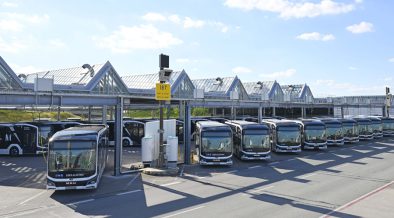
Munich Airport has officially unveiled its new electric bus depot, with Ulrich Lange, Germany’s Parliamentary State Secretary at the Federal Ministry of Transport in attendance.
Located on the southern part of the airport, the depot currently features 37 charging stations for battery-electric passenger transport vehicles.
An additional 13 charging points are scheduled to go online end of summer 2025 as part of the next construction phase. A third expansion stage is planned within the next two years, which will include 22 more chargers and carports equipped with photovoltaic systems.
“With this new depot, we’re building the necessary infrastructure for fully electrified ground operations on the aprons,” explained airport CEO, Jost Lammers.


“Half of our current ground fleet already runs on battery power. This project is another big step forward for our ‘Net Zero 2035’ strategy, bringing us closer to operating as a carbon-neutral airport.”
While Lange noted: “By subsidising 72 electric buses and the associated charging infrastructure, we are providing Munich Airport with targeted support to modernise its bus fleet.
“This sends a clear signal for progressive mobility, both for domestic and international guests. This investment demonstrates that innovative technologies are advancing beyond theory and being implemented in the daily operations of one of Europe’s largest airports.”
The gateway’s ‘Net Zero 2035’ sustainability strategy aims to ensure that Munich Airport’s operations leave no CO2 footprint by 2035 at the latest.
Thanks to its eBus fleet, Munich Airport currently saves more than 2,000 tons of CO2 annually. Once the full transition to electric vehicles is complete, this figure is expected to rise to over 4,000 tons per year.


As of May 2025, the airport’s ground handling subsidiary, AeroGround, operates 37 zero-emission transport units for apron passenger services, consisting of 20 standard-length and 17 articulated buses.
An additional 18 vehicles will join the fleet by year’s end. The long-term target is to expand to up to 72 vehicles, in line with operational needs and charging capacity.
Beyond passenger shuttles, AeroGround is steadily converting all ground handling equipment to alternative powertrains. In 2024 alone, 173 new zero-emission vehicles were introduced, including transporters, conveyor belts, stairs, lift trucks and passenger cars.
The project is funded under the ‘Guideline for the promotion of alternative drives for buses in passenger transport’ with a total of 23,8 million euros by the Federal Ministry for Transport (BMV).
Funding for this measure is also provided under the German Recovery and Resilience Plan (DARP) via the European Recovery and Resilience Facilities (ARF) in the NextGeneration EU program. The funding guideline is coordinated by NOW GmbH and implemented by Project Management Jülich (PtJ).






